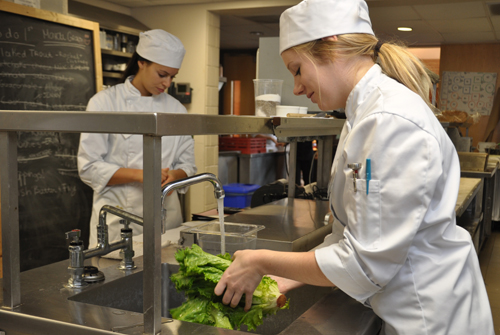
If you think you’re doing your part for the environment by eating at a restaurant that serves local food, think again. How much water and energy did the restaurant use to prepare your meal? The University of Guelph Sustainable Restaurant Project (UGSRP) is looking at ways to help restaurants reduce their carbon footprint.
Serving local food cuts down on transportation and pollution, but restaurants can do more. “We have a ways to go in our industry,” says Prof. Bruce McAdams, School of Hospitality and Tourism, who has worked in the food service industry for more than 20 years. “Water conservation is a huge issue in restaurants,” he adds. “A large-scale, full-service restaurant will use over a million litres of water in a year.” The biggest water-guzzling appliances are dishwashers and fridges, he says, but food preparation methods like thawing food under running water can also be wasteful.
Restaurant owners often neglect water conservation because they’re more preoccupied with the day-to day operations of their business. “We’re so busy managing our labour and our food cost that we don’t think of the running tap,” says McAdams. “Water costs are doubling every six years in municipalities in this province, so that’s going to be an ever-increasing issue for restaurants, and we want to bring some awareness to that.”
Part of the problem, he says, is that restaurant owners are more concerned about how their restaurant looks than how sustainable it is. “Capital investment is made in the front of house for the aesthetics of restaurants, if investment is made at all, as opposed to new kitchen equipment.” McAdams says it’s not uncommon for restaurants to use older kitchen appliances until they break down rather than spend 20 to 30 per cent more on energy-efficient models. It could take between five and seven years’ worth of energy savings to recoup the extra cost.
Hotels, on the other hand, are more energy conscious than restaurants because their energy bills are higher due to their larger size. “Energy conservation in hotels is huge,” says McAdams. “There’s this relationship between saving costs and saving the environment.” To reduce energy and water consumption, some hotels offer “green washing,” giving guests the option of having their bed linens and towels changed every few days instead of every day. McAdams says hotels allocate about four per cent of their budget toward capital improvements, which includes energy-efficient kitchen equipment.
Earlier this year, student-run PJ’s Restaurant received a $15,000 grant from the University’s Learning Enhancement Fund to incorporate sustainability into its restaurant course. Teaching environmental awareness to the next generation of restaurant and hotel managers is a step toward a greener hospitality industry, says McAdams. As part of PJ’s sustainability makeover, the City of Guelph will conduct a water audit and recommend water-saving measures.
In addition to calculating meal costs, students will also conduct a life cycle analysis to determine how “green” the meal is based on farming techniques, use of pesticides and fertilizers, transportation and packaging. “They’ll be learning the responsibility that we have in the food we serve,” says McAdams. Prof. Simon Day, who teaches HTM 3090: Restaurant Operations Management, has purchased software that provides nutritional information, including calories, fat and sodium content for each meal, which will be listed on PJ’s menu.
The PJ’s makeover and HTM curriculum changes are both goals of the school’s sustainable restaurant project, as is industry collaboration on sustainability issues. To that end, HTM professor Mike Von Massow will host a national panel discussion on sustainability in Canadian foodservice on Oct. 26 beginning at 5:30 p.m. in the OVC Lifetime Learning Centre, Room 1714.